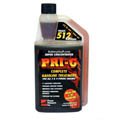Written Tutorial | OK, who's got gas? Fuel, that is.
The first thing you must understand about today's fuels is that the environment is the first consideration and the engine performance comes second. The Environmental Protection Agency (EPA) plays a heavy hand in today's Gasoline and Diesel fuels development.
The Mis-Information Crisis.

No, it's not a conspiracy but it sure is a mess. We have ongoing changes in air pollution standards in the United States. The Environmental Protection Agency (EPA) mandates changes in fuel chemistry to meet these cleaner air standards.
The engine manufacturers are also required to produce engines with computer controlled emission devices to further reduce air pollution. When we "the consumer" have a complaint about mileage, power, starting, general drivability, etc., what do we hear? It must be the gas/diesel, or it must be a problem with the computer or a sensor. If you have an engine with a carburetor, most likely when the engine was designed there was no concept of what gasoline would be like today.
When consumer complaints are related to fuel chemistry, the vehicle manufacture must collect enough data to prove to the fuel refiners and the EPA that a change in fuel chemistry is needed. Of course all this takes years. Most fuel chemistry changes must be approved by the EPA on a regional or national level. However, to bring a can or bottle of fuel additive to market is not nearly as difficult.
In monitoring weekend automotive radio talk shows, we have found over 30% of the questions phoned in by consumers are related to the fuel system. Who's to blame for our fuel system problems? The EPA, fuel refiners or vehicle manufactures? Well the EPA does not care about our problems and the refiners do what they are told by the EPA and the vehicle manufactures try to work with the gasoline and diesel that we end up with.
Refiners and vehicle manufactures don't make a public issue of the problems that exist with today's fuels. Admitting to problems carries a certain amount of liability. However, manufacturers' service bulletins and documents submitted to the Society of Automotive Engineers Fuels and Lubricants Committee support the statements I have made.
We have ended up with one size fits all fuels. Depending on the year, make, and model of the vehicle(s) you own, the extent to which your mileage and drivability suffers will vary.
With engines and fuels becoming more sophisticated, fuel quality and engine tuning has become more critical than ever before.
Let’s look at the problems created by fuel quality.
Problem: Stability
Cause: Age & Oxidation, Improper Blending & Manufacturing
Effect: gums; varnishes; poor combustion quality; carbon build-up; dirty injectors and carburetors; increased emission; power loss; shortened catalytic convert life; computer sensors failure
Problem: Lubricity
Cause: Reformulated Fuels
Effect: Shorten life of fuel pumps and injectors. Power lost (Gas and Diesel)
Problems: Phase Water
Cause: Improper Storage and Fuel Handling
Effect: Algae in Diesel. Peroxide in Reformulated Gasoline. Decreased Stability
Due to EPA mandates, gasoline and diesel fuels are very similar from brand to brand. Low Sulfur diesel and reformulated gasoline provides less performance than previous fuels.
Reformulated/Oxygenated Gasoline accounts for 30% of all gasoline sold in the US. The EPA is ever increasing the requirement of special design fuels.
Low Sulfur Diesel for highway use is sold in all 50 states. California low sulfur diesel is only slightly different. No fuel system is exempt from problems. Since 1991 there has been a 500% increase of additive sales.
Fuel additives are now sold by most dealerships and they are very expensive.
Misinformation and deception about the fuel we buy is common. The Federal Trade Commission (F.T.C.) has sued numerous refiners concerning false advertising as to performance and additives in gasoline. High Octane is usually a waste of money. In some new design engines high octane can leave more deposits.
The phrase "Premium Diesel" means nothing: there is no "national definition". You have to ask what it is.
Watch out for those warranty loopholes. We are told to use a "good quality fuel." We are responsible for the fuel we buy.
Many fuel distributors that service fleets have selected to treat their fuels with extra additives to assure keeping their customers. Many fleet operators also request additives to assure quality and performance of the fuel they buy.
If you procure the fuel service manuals of any Gas or Diesel engine manufacturers you will find a section discussing the use of additives. Of these, fuel stability is most important factor in today's fuels.
It is cheaper to maintain your fuel system than it is to fix it. The benefits of a good multi-function fuel additive are very cost effective. Engine performance and mileage will remain consistent. Also, you will improve the longevity and reliability of fuel system components and emission control devices.
 We offer Power Research Inc. (PRI) fuel treatments. PRI manufacturers concentrated commercial grade multi-function fuel treatments.
We offer Power Research Inc. (PRI) fuel treatments. PRI manufacturers concentrated commercial grade multi-function fuel treatments.
To learn more about fuel storage and restoration click here.



